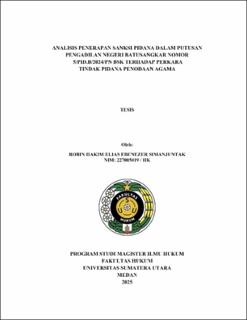| dc.description.abstract | Religion holds an essential role in the social order of Indonesian society.
However, in practice, interreligious relations are not always harmonious and often
give rise to tensions triggered by intolerance, divergent interpretations, and broader
social dyn amics. Religious defamation remains a highly sensitive issue requiring
careful and proportionate legal handling. This study aims to analyze the regulation of
religious defamation within Indonesia’s criminal law system, assess the criminal
liability of the perpetrator, and examine the application of criminal sanctions in the
District Court Decision of Batusangkar No. 5/Pid.B/2024/PN Bsk.
This research adopts a normative juridical method with a descriptive
approach, employing statutory and case approaches. Th e data used are secondary in
nature, collected through literature review and document study. The data were then
analyzed qualitatively and concluded deductively.
The findings reveal that the legal regulation of religious defamation remains
partial and ambi guous, particularly under Article 156a of the Indonesian Criminal
Code, thereby failing to ensure legal certainty. In the case at hand, the criminal
liability of the defendant was deemed legally established, as elements of culpability,
criminal capacity, a nd the absence of justifying or excusing grounds were fulfilled.
However, the two year prison sentence imposed by the court is considered
disproportionate to the gravity of the offense, which was carried out deliberately,
repeatedly, and for financial gain . The court's reasoning placed greater emphasis on
rehabilitation, while neglecting the balance with retributive and deterrent objectives.
Furthermore, weaknesses in the prosecutorial strategy including the omission of
relevant legal instruments such as th e Electronic Information and Transactions Law
(ITE Law) and the absence of an appeal further undermined the effectiveness of
criminal punishment. Accordingly, the decision does not fully reflect a comprehensive
application of penal theory in safeguarding r eligious values and public order. | en_US |


